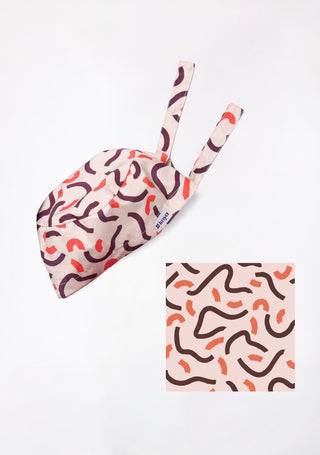In hospitals and clinics, keeping everything clean is very important. Doctors, nurses, and other medical workers use special clothes and tools to stop germs from spreading. Two common things they wear on their heads are scrub caps and surgical caps. Both caps help keep hair from falling into clean places and stop germs from spreading. But, even though they look similar, scrub caps and surgical caps are not the same. They have different uses, designs, and rules for cleaning. In this blog, we will explain the differences between scrub caps and surgical caps in a simple way.
Ready to explore our amazing scrubs collection? Browse the best here
What Are Scrub Caps?
Scrub caps are hats worn by many people who work in hospitals. Nurses, lab workers, and doctors can wear them while doing their daily jobs. These caps cover the hair and keep it neat so hair does not fall on patients or equipment. Scrub caps come in many colors and patterns. They are often made from cotton or other soft materials so they are comfortable to wear for a long time. They can be washed and used again. Scrub caps do not need to be sterile, which means they do not have to be completely free from germs, but they should be clean.
What Are Surgical Caps?
Surgical caps are special caps worn only in operating rooms. Surgeons, anesthesiologists, and surgical nurses wear them during operations. Surgical caps cover not just the hair but sometimes the ears and forehead too. Their job is to stop any germs from the person’s hair from getting into the patient during surgery. Because of this, surgical caps must be sterile. This means they are clean and free from germs before use. Surgical caps are often made from materials that cannot be reused. They are usually thrown away after one surgery to keep things safe.
How Are Scrub Caps and Surgical Caps Different?
Here are the main differences:
- Purpose: Scrub caps are for everyday hospital work. Surgical caps are only for surgeries.
- Design: Scrub caps can look simple or fun, with many styles and colors. Surgical caps are plain and cover more of the head.
- Sterility: Surgical caps must be sterile. Scrub caps usually do not have to be sterile.
- Reusability: Scrub caps can be washed and reused. Surgical caps are often thrown away after one use.
- Material: Scrub caps are usually made of soft cloth. Surgical caps are made from special disposable materials.
Click here to explore comfortable lab coats and discover our complete collection of comfortable and stylish medical apparel
Why Do We Need Both?
In hospitals, different jobs need different kinds of protection. When doctors or nurses are helping patients in normal rooms, scrub caps keep hair neat and clean. But in the operating room, there is a much higher risk of infection. Here, surgical caps keep everything as clean as possible to protect the patient. Each cap is made for its own purpose and helps the medical team do their job safely.
How to Choose Between a Scrub Cap and a Surgical Cap?
If you work in a hospital or clinic, choosing the right cap depends on your work:
- For daily work like taking blood or checking patients, scrub caps are good because they are comfortable and can be reused.
- For surgery or any work in the operating room, surgical caps are a must because they keep everything sterile and safe.
Cleaning and Care
Scrub caps need to be washed regularly. They should be cleaned after each use to stay fresh and reduce germs. Because they are reusable, you want to use good detergent and wash them well.
Surgical caps usually do not need cleaning because they are thrown away after one use. This helps stop the spread of germs between surgeries.
Styles and Colors
Scrub caps come in many styles. Some are tight like beanies, and others are loose and puffier. They can have fun colors, patterns, or even cartoons. This helps medical workers feel more comfortable and show some personality.
Surgical caps are simple. They are usually one color like white, blue, or green. This is because their main job is to protect, not to look nice.
Where to Buy Scrub Caps and Surgical Caps?
You can buy scrub caps and surgical caps from places that sell medical uniforms. One brand you can trust is KNYA. KNYA offers different types of scrub caps and surgical caps that are good quality and comfortable. They make sure their caps are safe and meet hospital rules.
Conclusion
Scrub caps and surgical caps might look the same at first, but they have clear differences. Scrub caps are for daily work and comfort, while surgical caps are for surgeries and safety. Knowing when to use each cap helps keep hospitals clean and patients safe. If you work in healthcare, picking the right cap is very important for your safety and your patients’ safety. Whether it is a colorful scrub cap or a sterile surgical cap, each plays a special role in health care. Brands like KNYA provide good options that meet these needs.













